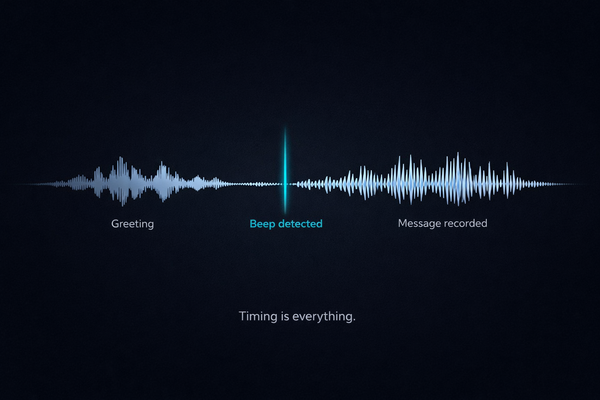Conversational AI for Customer Service: The Ultimate Guide for 2025

Imagine offering your customers instant, personalized support that feels human without overwhelming your team or breaking the bank. Conversational AI for customer service will make this a reality in 2025, transforming how businesses engage with their audience. Whether you are in healthcare, eCommerce, or education, this technology can elevate your customer experience while streamlining operations.
This guide will cover everything you need to know about conversational AI, from how it works to practical applications and best practices. Designed for businesses looking to enhance customer support, this beginner-friendly resource will help you leverage tools like those from Anyreach.ai to delight your customers and empower your team.
Why Conversational AI is Essential for Customer Service in 2025
Conversational AI is reshaping customer service by enabling businesses to provide fast, personalized support across industries like SaaS and retail. Unlike traditional chatbots, modern AI uses advanced natural language processing to understand and respond to customers in a human-like way. According to Fortune Business Insights, the conversational AI market is projected to grow from USD 12.24 billion in 2024 to USD 61.69 billion by 2032, reflecting its growing impact.
Here is why conversational AI is a must-have for your business:
- Deliver instant support 24/7, meeting the 77% of customers who expect immediate responses, as per Salesforce research.
- According to IBM, reduce operational costs by up to 30% by automating repetitive tasks.
- Enhance customer engagement through personalized interactions, boosting satisfaction and loyalty.
- Free up agents to focus on complex issues, improving efficiency and reducing burnout.
To explore more ways to optimize customer interactions, check out Anyreach’s AI solutions for seamless support across channels.
How Conversational AI Works in Customer Service?
Understanding the mechanics of conversational AI helps you see its potential for your business. This technology combines several components to create human-like interactions. By leveraging these tools, companies can automate support while maintaining a personal touch.
Here is a breakdown of how conversational AI powers customer service:
- Natural Language Processing (NLP): Interprets customer queries and understands intent and context for accurate responses.
- Machine Learning (ML): Learns from past interactions to improve response quality over time.
- Natural Language Understanding (NLU): Deciphers the meaning behind customer inputs, even with varied phrasing.
- Natural Language Generation (NLG): Crafts human-like replies, ensuring natural dialogue flow.
For example, Anyreach’s AI-Chat uses these technologies to handle inquiries across industries, such as healthcare, ensuring that responses feel empathetic and relevant.
Key Use Cases for Conversational AI in Customer Service
Conversational AI offers versatile applications to streamline customer support. Automating routine tasks and enhancing agent efficiency transform how e-commerce or education businesses serve their customers.
Consider these practical use cases for conversational customer service:
- AI Chatbots can handle FAQs, process orders, or troubleshoot issues 24/7. For instance, an eCommerce business can use Anyreach’s AI chat to guide customers through returns, boosting satisfaction.
- AI Voice Bots: Engage in voice-based conversations to reduce call volumes. These bots can book appointments or provide order updates, which is ideal for travel and hospitality.
- AI Agent Assist: Provide real-time suggestions to agents, pulling data from CRMs or knowledge bases to speed up resolutions. This is especially useful in financial services.
- Conversational Commerce: Drive sales by recommending products based on customer behavior, increasing upsells by up to 20% per Intercom’s data.
Benefits of Conversational AI for Customer Support
Implementing conversational AI brings measurable advantages to businesses and customers alike. Integrating tools like Anyreach’s AI-Inbox allows you to unify communication channels and deliver seamless experiences.
Here are the key benefits of conversational customer support:
- 24/7 Availability: Meet customer expectations for instant support, with 74% preferring chatbots for quick answers, per Outgrow.
- Cost Efficiency: As IBM reports, automating repetitive inquiries can reduce support costs by up to 30%.
- Improved Engagement: Personalize interactions to boost engagement. According to Salesforce, 55% of consumers use self-service chatbots.
- Agent Productivity: Free agents from routine tasks, reducing burnout and improving first-contact resolution rates.
Best Practices for Implementing Conversational AI
Follow these best practices to maximize the impact of conversational AI, ensure a smooth rollout, and create positive customer experiences. These strategies align with insights from top-performing platforms like Zendesk and Intercom.
Adopt these approaches to optimize your conversational AI strategy:
- Be Transparent: Indicate when customers interact with AI to build trust, as 89% of consumers want to know, per Salesforce.
- Build a Robust Knowledge Base: Ensure your AI, like Anyreach’s AI-Connector, integrates with comprehensive data sources for accurate responses.
- Enable Human Handoffs: Provide easy access to human agents for complex issues, preserving conversation context for seamless transitions.
- Monitor Performance: Track metrics like resolution rates and customer satisfaction (CSAT) to refine AI performance using tools like Anyreach’s AI insights.
- Align with Brand Voice: Customize AI responses to match your brand’s tone, ensuring interaction consistency.
Can Conversational AI Replace Human Agents?
A common question is whether conversational AI will replace human customer service agents. While AI excels at automating routine tasks, it cannot fully replicate human empathy and problem-solving for complex issues. According to Zendesk, 65% of consumers rate human agents higher for understanding nuanced problems. Instead, AI augments agents, handling up to 30% of support requests per Intercom so that agents can focus on high-value interactions.
For example, Anyreach’s Human-in-the-Loop service ensures AI and human agents work together, blending efficiency with empathy to enhance customer experiences in insurance-related industries.
Final Words
Conversational AI for customer service will be a game-changer for businesses in 2025. It will offer instant, personalized support while reducing costs and agent workload. By leveraging tools like Anyreach’s AI-Chat and AI-Inbox, you can deliver delightful experiences across industries like eCommerce and healthcare. Start with clear goals, build a robust knowledge base, and follow best practices to ensure success. Embrace conversational AI today to transform your customer support and stay ahead in a competitive landscape.
FAQs
How can AI be used in customer service?
AI automates tasks like answering FAQs, processing orders, and providing 24/7 support through chatbots and voice bots. It also assists agents with real-time suggestions, improving efficiency across industries like SaaS.
What is the AI tool for customer service?
AI tools include chatbots, voice bots, and agent assist solutions. Anyreach’s AI-Inbox unifies channels like email and social media, while AI-Insights tracks performance for continuous improvement.
Can I use ChatGPT for customer service?
ChatGPT can handle basic queries but lacks the specialized training of customer service-focused AI like Anyreach’s AI solutions. Dedicated platforms offer better integration with CRMs and knowledge bases for tailored support.
What are the challenges of implementing conversational AI in customer service?
Challenges include ensuring AI understands complex queries, maintaining data privacy, and avoiding customer frustration from limited responses. Anyreach’s Human-in-the-Loop service addresses this by seamlessly transitioning complex issues to human agents, ensuring a smooth experience in industries like financial services.
How do I measure the success of conversational AI in customer service?
Track metrics like resolution rate, customer satisfaction (CSAT), and escalation rate. Anyreach’s AI-Insights provides analytics to monitor performance, helping businesses in healthcare, travel, and hospitality optimize AI-driven support for better outcomes.




![[AI Digest] Agents Coordinate Plan Deploy Scale](/content/images/size/w600/2025/07/Daily-AI-Digest.png)